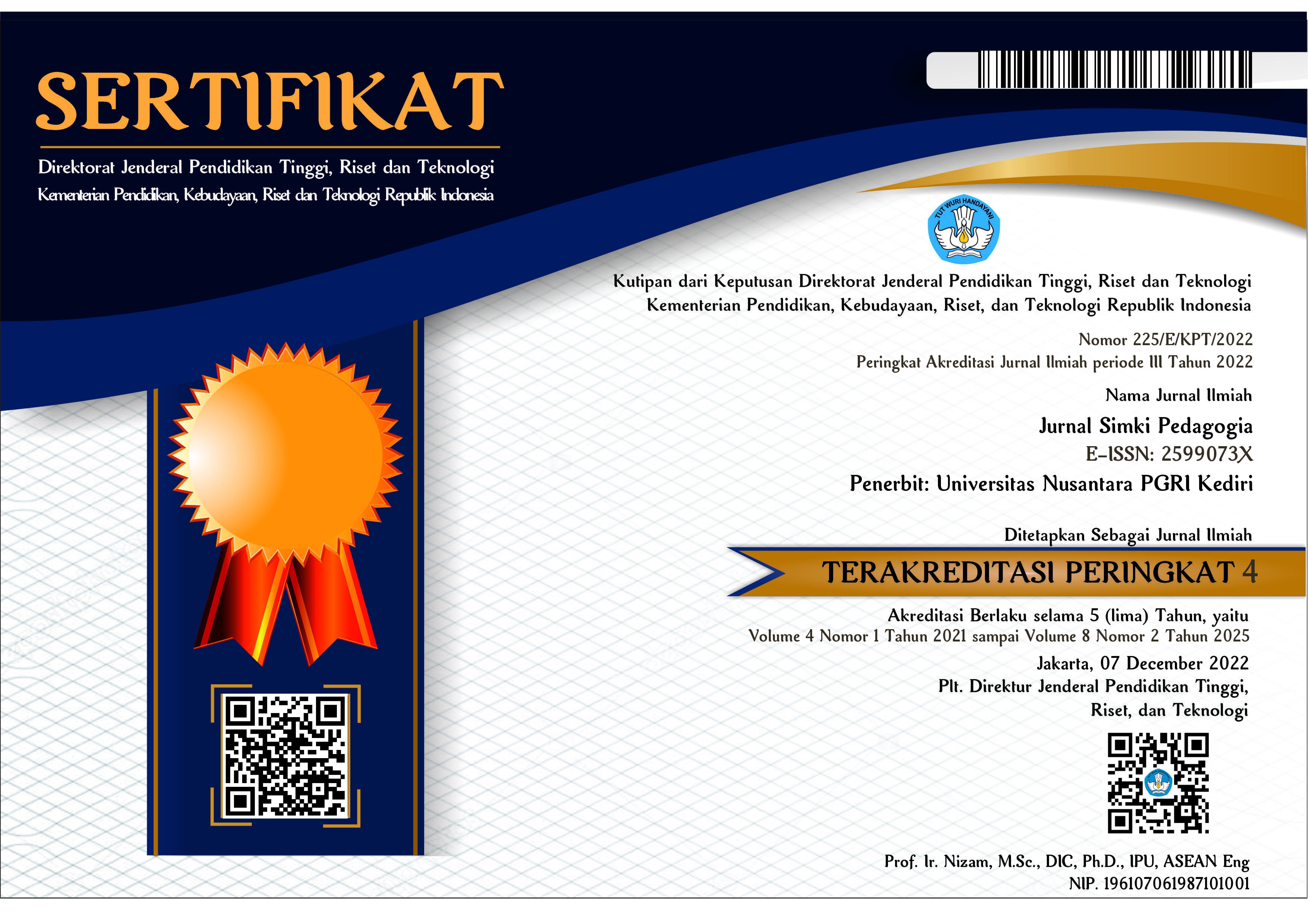Analysis Factors Teachers Occupational Well-Being
 Abstract views: 415
,
Abstract views: 415
,
 PDF (Bahasa Indonesia) downloads: 164
PDF (Bahasa Indonesia) downloads: 164
Abstract
Teacher occupational well-being factors include various components that influence them both from a physical, social, economic, psychological and legal perspective. This research uses a quantitative development instrument which aims to develop an instrument in the form of items and factors/components so that adequate validity results are obtained. We have obtained the results of developing a total of 75 items on the teacher work welfare scale which have been tested on 23 teachers. By using exploratory analysis, valid item results with factor loading > 0.5 were obtained for 38 items with four factors formed from a rotated component matrix with item values of 0.52 (lower) - 0.867 (higher). As a result of these factors, factors were named, namely factor 1 is recognition and satisfaction of professional work with a total of 13 items, factor 2 is self-development skills with a total of 9 items, factor 3 is administrative system support with a total of 9 items, factor 4 is balance of school culture with a total of 7 items. and this development instrument has obtained a reliability of 0.964.
Downloads
References
Arifin, N., Karim, K., Lusono, A., Rukhmana, T., Sakti Walenta, A., & Rusdi, M. (2023). Pengaruh Budaya Sekolah Terhadap Kinerja Guru Di SMPN 3 Baso. Journal on Education, 6(1), 3868-3878. https://doi.org/10.31004/joe.v6i1.3502
Badaruddin, A., & Said, E. (2016). Hubungan Kesehatan Mental dengan Motivasi Belajar Siswa (Vol. 5). https://doi.org/10.24036/02016516543-0-00
Doble SE, Santha JC. Occupational Well-Being: Rethinking Occupational Therapy Outcomes. Canadian Journal of Occupational Therapy. 2008;75(3):184-190. https://doi.org/10.1177/000841740807500310
Escaron, A. L., Vasquez, J., & Sonik, R. A. (2023). Associations between Teacher Wellbeing and Social Support for Physical Activity in Two Urban School Districts during the early stages of the SARS-CoV-2 Pandemic. Journal of healthy eating and active living, 3(3), 134–145. http://www.ncbi.nlm.nih.gov/pmc/articles/pmc10854958/
Fraser, P. (2020). Teachers’ well-being: A framework for data collection and analysis for PISA and TALIS. https://doi.org/10.1787/c36fc9d3-en
Harding, S., Morris, R., Gunnell, D., Ford, T., Hollingworth, W., Tilling, K., Evans, R., Bell, S., Grey, J., Brockman, R., Campbell, R., Araya, R., Murphy, S., & Kidger, J. (2019). Erratum: Is teachers’ mental health and wellbeing associated with students’ mental health and wellbeing?. In Journal of Affective Disorders (Vol. 253, pp. 460–466). Elsevier B.V. https://doi.org/10.1016/j.jad.2019.03.046
Lestari, L., & Rista, N. (2023). Pengaruh Kesehatan Mental Terhadap Efektivitas Belajar Siswa Kelas VIII pada Mata Pelajaran IPS Di SMP Negeri 20 Bekasi. Research and Development Journal of Education, 9(2), 881. https://doi.org/10.30998/rdje.v9i2.19297
Mccallum, F., & Price, D. (2010). Well teachers, well students. In Journal of Student Wellbeing (Vol. 4, Issue 1). https://doi.org/10.21913/JSW.v4i1.599
Purwanto, D. (2018). Analisis Faktor: Konsep, Prosedur Uji Dan Interpretasi. Jurnal Teknodik, 4(15), 153–169. https://doi.org/10.32550/teknodik.v4i15.388
Raudhah, R. (2020). Hubungan Tingkat Kesejahteraan Guru Dengan Semangat Kerja Guru. Jurnal Guru Dikmen Dan Diksus, 3, 186–196. https://doi.org/10.47239/jgdd.v3i2.151
Ryff, C. D., & Keyes, C. L. M. (1995). The Structure of Psychological Well-Being Revisited. Journal of Personality and Social Psychology, 69(4), 719–727. https://doi.org/10.1037/0022-3514.69.4.719
Schleicher, A. (2018). Valuing our Teachers and Raising their Status: How Communities Can Help, International Summit on the Teaching Profession, OECD Publishing, Paris, https://dx.doi.org/10.1787/9789264292697-en.
Sutiono, Dr. (2021). Profesionalisme Guru. Tahdzib Al-Akhlaq: Jurnal Pendidikan Islam, 4(2), 16–25. https://doi.org/10.34005/tahdzib.v4i2.1569
Suwandi. (2012). Faktor-Faktor Yang Mempengaruhi Penghasilan Guru Di Era Desentralisasi Pendidikan. In Jurnal Economia (Vol. 8, Issue 2). http://dx.doi.org/10.21831/economia.v8i2.1224
Teaching for Global Competence in a Rapidly Changing World. (2018). https://asiasociety.org/education/teaching-global-competence-rapidly-changing-world
Tschannen-Moran, M., A. Hoy and W. Hoy (2015). Teacher Efficacy: Its Meaning and Measure. Review of Educational Research, Vol. 68/2, pp. 202-248, http://dx.doi.org/10.3102/00346543068002202
UNDANG-UNDANG REPUBLIK INDONESIA NOMOR 14 TAHUN 2005. (n.d.).
Van Horn, J. E., Taris, T. W., Schaufeli, W. B., & Schreurs, P. J. G. (2004). The structure of occupational well-being: A study among Dutch teachers. In Journal of Occupational and Organizational Psychology (Vol. 77). https://psycnet.apa.org/doi/10.1348/0963179041752718
Warsah, I. (2018). Pembelajaran (Studi Man Rejang Lebong) Analysis Of Teacher’s Administrative Innovation In Improving The Instruction Quality (Case Study In Man Rejang Lebong). 16(3), 263–274. https://dx.doi.org/10.32729/edukasi.v16i3.488
Copyright (c) 2024 Titin Kholisna

This work is licensed under a Creative Commons Attribution 4.0 International License.

Jurnal Simki Pedagogia : https://jiped.org/index.php/JSP/index is licensed under a Creative Commons Attribution 4.0 International License.
















